Table of Contents
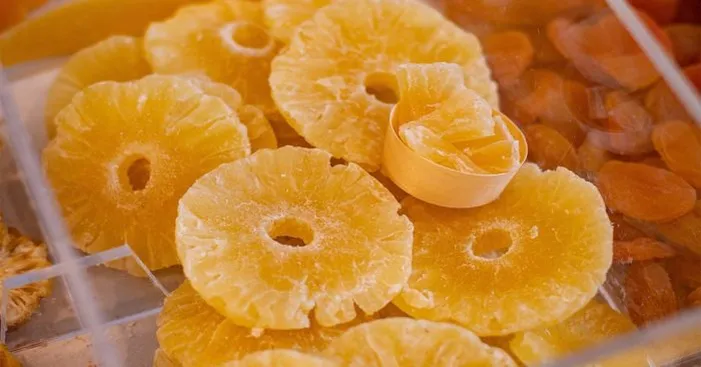
Dehydrated pineapple is much more than a dried fruit in terms of both taste and health benefits.
However, some people don’t pay close attention to the quality of the dehydrated pineapple and whether they are sweetened or not.
In this article, we gathered all the useful information you need to learn about dehydrated pineapple, its nutritional values, and health benefits, the precautions you need to know before eating it, and useful tips on how to buy + cook + store it!
But first, where do pineapples come from?
History of pineapple:

Pineapples come originally from South America and mainly from Paraguay from which they migrated to Central America.
The first time this fruit gained international recognition was during Christopher Columbus’s quests of Guadeloupe in 1493.
He stated, “the fruit has a shape similar to pine cones but it has twice the size and tastes sweet, it can be cut with a knife and it looks very healthy”.
However, it was England’s King Charles II who called them “pineapples” which combines the word “pine” and the word “apple” which refers to “fruit”.
Is dehydrated pineapple better than fresh pineapple?
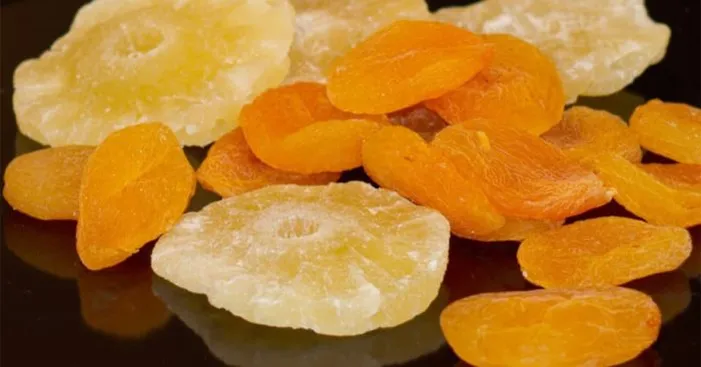
Most people are used to consuming pineapple fresh and they generally like it that way already.
Nonetheless, dehydrated pineapple is very pleasing, especially for little kids who enjoy its sweet taste.
In the kitchen, dried pineapple adds an amazing flavor to desserts.
Fresh pineapple contains a high concentration of organic acids which makes it not suitable for everyone.
On the other hand, dehydrated pineapple loses most of its organic acid content which makes it suitable for almost everyone.
Also, the dried version of pineapple is a better choice for those who want to lose a few pounds.
The worst part when being on a diet is the craving for sweets and this is what makes dehydrated pineapple very useful and less harmful.
Nutritional values and health benefits of dehydrated pineapple:
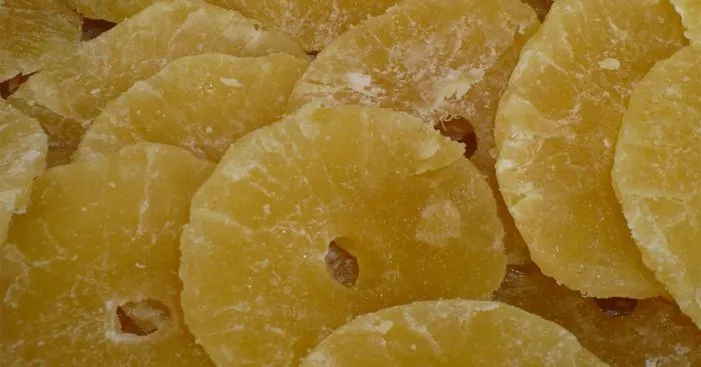
Nutritional values of dehydrated pineapple:
Dehydrated pineapple is a great source of vitamin A, vitamin C, and antioxidants.
In addition, it is rich in trace elements including phosphorus, manganese, calcium, and bromelain.
They are also free of sodium and rich in omega 3 and 6 which gives makes them beneficial for the cardiovascular system.
This dried fruit is characterized by a low-calorie value with only 110 calories per the recommended serving of 1.5 oz (42g).
This data counts for a serving of 1.5oz. (42g) of unsweetened dehydrated pineapple:

- Calories: 110
- Fibers: 1.5g
- Proteins: 2g
- Carbs: 25g
- A vitamin: 5%
- K vitamin: 2%
- B9 vitamin: 5%
- C vitamin: 11%
- Potassium: 7%
- Calcium: 15%
- Iron: 4%
- Copper: 15%
- Magnesium: 4%
- Phosphorus: 2%
Health benefits of dehydrated pineapple:
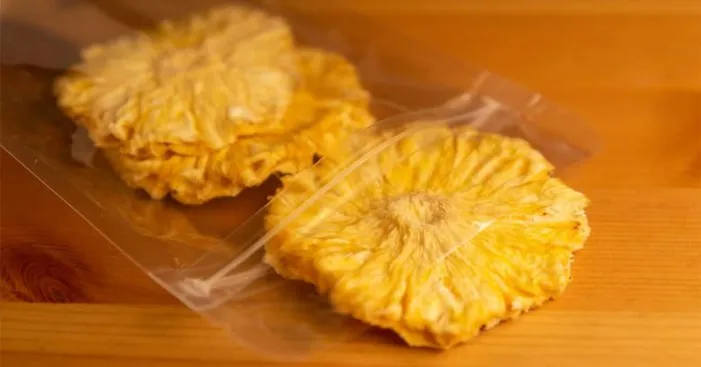
Improves the cardiovascular health:
Dehydrated pineapple offers natural substances that act as blood thinners which reduce the risk of blood clotting and plaque formation.
In addition, consuming dried pineapple accelerates the lymphatic flow and makes sure that it reaches every cell in the body.
Made mainly from white blood cells, lymph is a liquid that travels throughout to body to eliminate toxins and free roots.
Consequently, there is a lower risk of infection and the body is always on alert facing health threats.
An ally during pregnancy:
Pregnant women are more vulnerable to developing osteoporosis and this is one of many things that dehydrated pineapple may prevent.
For instance, this dried fruit offers assistance to many enzymes involved in bone formation which will maintain bone density.
Also, it offers a good amount of insoluble fibers which extend the feeling of satiety and reduce hunger between meals.
Dehydrated pineapple is also a great source of antioxidants and that reduces the risks of age-related diseases.
Good for the digestive system:
Dried pineapple contains fibers and other active ingredients that have a beneficial effect on our digestion.
In fact, consuming this dried fruit regularly improves the absorption of fatty acids and complicated proteins.
As a result, the microflora functions optimally by maintaining the cholesterol at the right level to preserve the intestines and the stomach.
Therefore, eating dehydrated pineapple regularly will extend the feeling of fullness while accelerating digestion.
Other dehydrated pineapple benefits:
- Natural pain-killing properties.
- Reduces the appetite and extends the feeling of satiety.
- Appropriate for a detox diet.
- An ally in fighting tumors.
- Relieves menstrual pain.
- Improves blood circulation.
- Provides energy and strength.
- Good food for the elderly.
- Promotes healthy skin and hair.
- Relieves stress and depression.
- Reduces fatigue and promotes relaxation.
- Speed up wound healing.
- Stabilizes blood pressure.
- Offers anti-aging proprieties.
Consuming dehydrated pineapple:
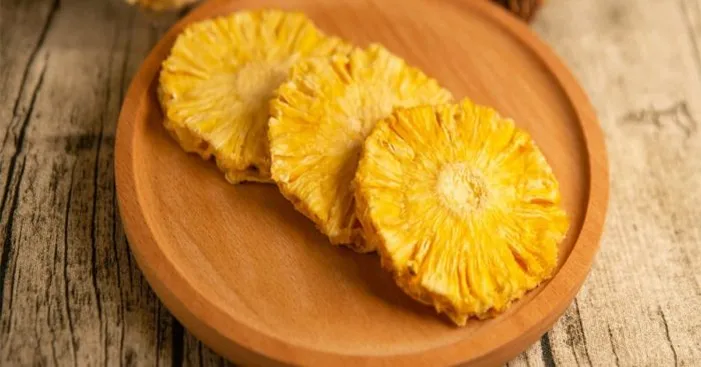
Just like any other industrial product, there are few risks when you are buying dehydrated pineapple from stores.
The fruit can be not organically grown or too much sugar and additives are added during the dehydrated process.
Most commercial products actually end up doing more harm than good.
Nonetheless, making dehydrated pineapple at home is so easy and requires little to no material.
Because of that, it is always better to make homemade dehydrated pineapple as it gives us a healthier choice.
Home recipe for dehydrated pineapple:
- Preheat your oven to 210°F (100°C).
- Start by the top and button sides of pineapples then remove the lateral skin to uncover the internal yellow flesh.
- Now cut the pineapple flesh into very thin disks almost the same thickness as your knife.
- Now place each pineapple disk on the oven tray and make sure they are spread evenly with no piece touching the other.
- Play the tray in the oven and dry the fruits for about 30 minutes per side (more or less depending on your oven so pay attention not to burn the fruits).
- Take them out and let them cool down at room temperature so they lose any remaining moisture, enjoy your dehydrated pineapple with your loved ones.
Recipes:
Dehydrated pineapple cake:
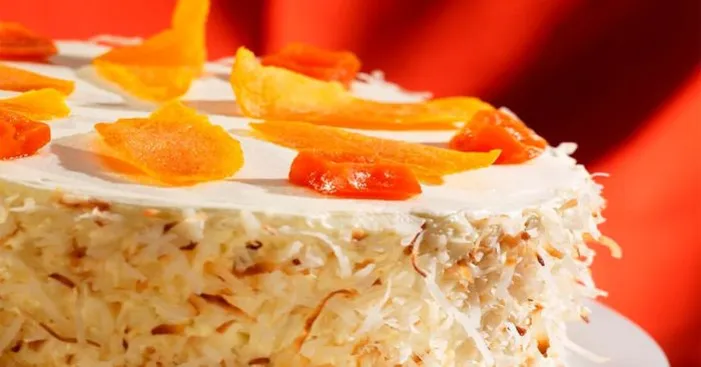
Ingredients:
- 3 tbsp of butter.
- 2 tbsp of whipped cream.
- 4 oz of dehydrated pineapple (cubes or crushed into small pieces).
- 2 tsp of yeast.
- 2 eggs.
- 3 oz of flour (84g).
- 2 oz of sugar (50g).
Preparation:
- Preheat the oven to 350°F (180°C).
- Start by mixing sugar with the two eggs in a bowl and beat them until you obtain a fluffy texture.
- Add flour, yeast, and dehydrated pineapples and mix the ingredients then add whipped cream and melted butter and continue mixing.
- Pour the cake mix on a convenient cake tray and place it in the oven for 25 minutes.
- When the surface of the cake starts looking golden, it should be done you just let it cool down then enjoy it with your loved ones.
- You can also use the toothpick tip by sticking a toothpick into the cake and making sure it comes out clean.
Quinoa salad with chicken breast, pistachios, and dehydrated pineapple:

Ingredients:
- 2 chicken breasts.
- 3oz of dehydrated pineapple (cubes or crushed into small pieces).
- 2 chopped onions.
- 1 tsp of cumin.
- 2 tsp of ginger powder.
- 1.5 cups of water.
- 1oz of pistachios.
- 1 cup of quinoa seeds.
- 1tsp of salt.
- 1 tbsp of sesame oil.
Preparation:
- In a pot, start by boiling the water.
- Add the quinoa seeds to boiling water and reduce the heat to a medium 300°F (150°C), cover the pot, and let it cook for 12 minutes.
- Heat sesame oil in a frying pan and fry the onions until they become soft then add pistachios while stirring until they are toasted.
- You can now add the chicken breast to the frying pan and let them cook for 3 minutes then turn them to the other side and cover the pot for 7 more minutes.
- Add cumin, and salt to the bowl and mix the ingredients together.
- Serve the grilled chicken breast with the quinoa mix on the side and enjoy this healthy dish!
Precautions before you consume dehydrated pineapple:

Consuming dehydrated pineapple is generally safe for everyone as long as we moderately do that.
However, most commercial products undergo a sweetening process that adds sugar and additives which could be harmful.
Also, some people may need to stay away from dehydration due to already existing health issues.
Among the precautions you need to know about before consuming dehydrated pineapple:
Allergy:
Some people could experience an allergic reaction when they consume dehydrated pineapple.
This could be caused by the bromelain and profiling content that remains in fruit even after dehydration.
People who are allergic to fresh pineapple, carrots, and asparagus should not consume dehydrated pineapple to avoid symptoms such as:
- Swollen tongue and lips.
- Itching and rash.
- Dizziness.
- Constipation.
- Anaphylactic reaction (requires emergency).
Blood sugar problems:
With more than 21g of sugar per serving of sweetened and dehydrated pineapple, they may damage health.
Consuming sweetened dehydrated pineapple could create problems, especially for people with already existing blood sugar issues.
This could lead to sudden peaks in blood sugar levels which could increase the risk of diabetes, heart attacks, and cancer.
Because of that, it is also better to buy unsweetened products or simply make your dehydrated pineapple at home with no added sugar.
Tooth decay:
When buying the commercial sweetened dehydrated pineapple, we don’t pay attention to how much sugar and acidic content.
With regular consumption of commercial dried pineapple, there is a higher risk of enamel erosion.
Therefore, the teeth become more vulnerable to decay as they lost most if not all of their protective layer.
Drug interactions:
Especially for patients who use blood thinners, eating dehydrated pineapple regularly could result in health issues.
These drugs are made to thin the blood and when eating this dried fruit it thins the blood even furthermore which could lead to:
- Bleeding.
- Chest pain.
- Fever and dizziness.
Buying pineapple:
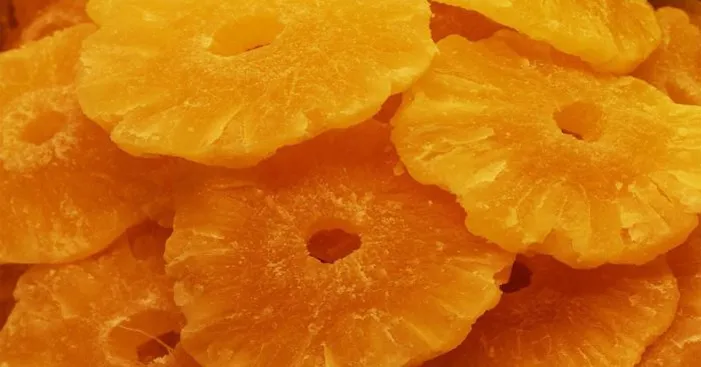
To choose the best pineapple there are a few tips anyone can follow:
- Weight: Most of the mass of pineapple comes from its water content therefore a nice and juicy one should be heavy.
- Color: The outside color of pineapple can be tricky as greenish pineapples can also have juicy flesh on the inside so you need to look into the other tips instead.
- Density: You can take the fruit in your hand and apply a little pressure with your finger and make sure that it doesn’t go inside easily.
- Crown: a mature pineapple must have a fully developed crown on top that can be peeled off easily.
- Pulp: after buying pineapple and cutting it in halves, the pulp should be bright yellow and not white or pale in color.
- Taste: a fresh pineapple should have a delicate sweet aroma with no unpleasant smell.
Buying dehydrated pineapple:
The first thing you need to pay close attention to when buying dehydrated pineapple is the color.
The pineapple disks should have a bright yellow color with a hard texture and a not very sweet taste.
In fact, this is what differentiates dehydrated pineapple from the candied ones which often are too sweet.
However, for those who don’t mind sweetness they can find candied and dried pineapple.
Nowadays, people even use dried pineapple in cooking to make cakes, ice cream, and other desserts.
Storing dehydrated pineapple:
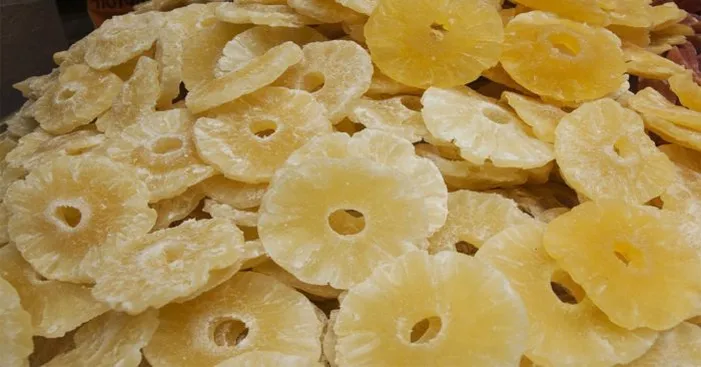
Thanks to their low water content, a dehydrated pineapple is so easy to store and can last for a long time.
In fact, the dried version of pineapple offers a longer lifespan than fresh fruits which makes it a great conservation technique.
This is because without moisture there is little to no risk of developing small microbes that are usually the main cause of spoilage.
In general, dried fruits can last up to 12 months if we keep them in a dry place and away from heat or light.
The best way to store dehydrated pineapple is in a dark glass jar to protect it from light and moisture.
However, to extend the lifespan of dehydrated pineapples you can place them in an airtight container and store them in the fridge.
